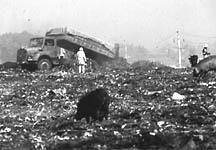Carrying over
 traditional waste treatment which mainly involves the concept of composting has been prevalent in many Asian cities. While earlier, large, mechanised composting plants were the norm, they failed as the equipment often broke down or else the final product was too expensive to find markets. The focus is now on the potential which decentralised composting holds for solid waste management.
traditional waste treatment which mainly involves the concept of composting has been prevalent in many Asian cities. While earlier, large, mechanised composting plants were the norm, they failed as the equipment often broke down or else the final product was too expensive to find markets. The focus is now on the potential which decentralised composting holds for solid waste management.
Decentralised composting depends upon small-scale, low-mechanised processes such as windrows or piles that are aerated with poles and turned with front-loaders or spades. Sites are chosen on small sections of land, perhaps unused areas of river banks or a little-used part of a park. The aim is to keep the maturation cycle short by efficient management to achieve a swift turnover and thus increasing the amounts that can pass through the system.
Low production costs and steady markets for the compost are critical, especially if composting is not subsidised as an essential waste treatment by city authorities. Market analysis to understand the patterns of demand is essential if the practice is to spread to a significant number of sites in a city. Ecological considerations are also important in site selection; for instance, there should be no danger of water contamination from the process. Reasonably-priced compost can be used in tropical cities which have peri-urban intensive farming, or in households which keep potted plants, in parks and ornamental gardens for major government and corporate buildings. The attractiveness of decentralised composting for city waste authorities is that the transport costs of collecting and taking wastes to disposal sites are saved. However, municipal governments have not taken an initiative in promoting the practice. Rather, the idea is being explored by co-operative projects funded by universities and international agencies and by ngo groups involved in waste reduction.
Java in Indonesia, has taken the lead in decentralised composting. The co-operative project of the Harvard Institute of International Development and the Centre for Policy Implementation Studies in Jakarta is a ready example. The techniques developed in this project, promoted by the newly formed Indonesian Recycling Forum, for swift turnover (50 days) and market exploitation were based on a careful study of the waste recovery-recycling system of the city and thorough technical experiments.
Similarly, Waste Wise, an organisation in Bangalore and the Gujarat-based Centre for Environmental Education, have demonstrated the concept of decentralised composting with vermiculture in two city parks. The Bangalore city corporation has made the space available for several compost pits, and the two organisations have mobilised teams of collectors to bring the organic wastes from about 300 households participating in the experiment. Good separation of the household organic wastes is crucial for these projects.
Another initiative is being sponsored by the United Nations Centre for Human Settlements, where funds have been allocated for the development of a small-scale composter-digester designed for use in congested areas. The equipment which is undergoing tests will soon be used in a number of cities in major developing regions worldwide and training programs will be designed to assist local efforts to promote the adoption of the equipment.
Decentralised composting in spite of its advantages has certain operational drawbacks: finding appropriate sites and selling the compost steadily at a price; building and maintaining adequate infrastructure; recruiting and training competent staff at each site; sustaining community participation in source separation and controlling vermin.
The projects that have started so far are recording their own progress; there are now enough such projects to allow some comparison of results. Such comparison, and further research will need the support of an international funding agency. Broader research on the following topics is necessary:
• optimal composting techniques
• quality of the compost, including possible heavy metal contamination
• vermin problem
• potential of vermiculture
• long-term environmental effects of concentrating compost from household wastes in certain areas such as parks
This will be of use to assess the pros and cons of decentralised composting as a basic technique of solid waste management in tropical cities.
Christine Furedy is actively involved in the Urban Studies Programme at the York University, Ontario, Canada
Related Content
- Reply affidavit on behalf of the Central Ground Water Board (CGWB) regarding state of groundwater in Haryana, 03/05/2025
- Reply filed by the state of Odisha regarding increasing instances of high energy swell waves, May 1, 2025
- Order of the National Green Tribunal regarding illegal mining of laterite stone, Ulliyeri village, Kozhikode, Kerala, 01/05/2025
- Judgment of the National Green Tribunal regarding illegal mining of soapstone in village Papon, Bageshwar district, Uttarakhand, 22/04/2025
- Affidavit by Wetland Authority of Delhi regarding increased urban flooding in Delhi and its connection to the disappearance of water bodies, 07/04/2025
- Order of the National Green Tribunal regarding building a highway encroaching upon the protected pond in south west district of Delhi, 04/04/2025
